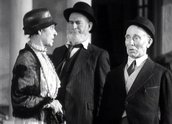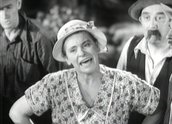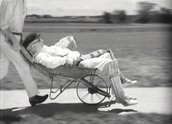


Grandad Rudd (1935)
Synopsis
The battling pioneer settler Dad Rudd (Bert Bailey) has now become a grandfather and a prosperous grazier, but no less careful with his money. His sons Dave (Fred MacDonald), Joe (William McGowan) and Dan (George Lloyd) do most of the farm work, for meagre wages, while enduring their father’s insults and tyranny. Egged on by their wives, the sons storm up to the big house, threatening to leave. Grandad Rudd initially grants them a wage increase, then raises their rent by an equal amount. When eldest grandchild Betty (Elaine Hamill) announces her intention to marry a shifty neighbour, Henry Cook (John D’Arcy), Grandad Rudd joins forces with her suitor, Tom Dalley (John Cameron) to unmask Cook as a liar and an ex-convict.
Curator’s notes
Grandad Rudd was made quickly in late 1935, after the box office failure of Ken Hall’s fourth feature at Cinesound, Strike Me Lucky. Hall hated making failures, so Grandad Rudd was an attempt to repeat the great box office success of On Our Selection (1932) and The Squatter’s Daughter (1933), his first two films. Grandad Rudd was indeed a reasonable financial success, although it isn’t one of Hall’s best films. There’s a lot of amiable slapstick humour, but not much of a story. Hall devotes little effort to characterisation, beyond the character of old Mr Rudd himself – played again by Bert Bailey – but this time the old curmudgeon is barely likeable. He bullies his sons and their wives, he’s a miser and a drunk and something of a professional grump. His children aren’t much better. Prodigal son Dan tells his other two brothers that he’s ‘stopping round ‘ere till ‘e pegs out, to get me share, the same as you’.
Much of the film is taken up with comical sketches that reduce the film’s emotional effectiveness. Many of these are the old-fashioned silent film-style routines that Hall had yet to leave behind, even in 1935, seven years after the coming of sound. Still, some of these sketches are beautifully put together to entertain audiences who were desperate for a good laugh, in the midst of the Depression. The drunken routine in clip one is a series of well-timed gags that owe a lot to vaudeville, but Hall makes good use of dialogue too, as the two men prattle on while trying to ride a horse. These scenes are part of a long tradition in Australian cinema of lampooning the wowsers in society – represented in the film by the temperance meeting that the Rudds are uncomfortably hosting when Grandad and his neighbour arrive home.
- Overview
- Curator’s notes
- Video 3 clips

- Principal credits
- Find a copy
- Make a comment
- Map
- Add your review



